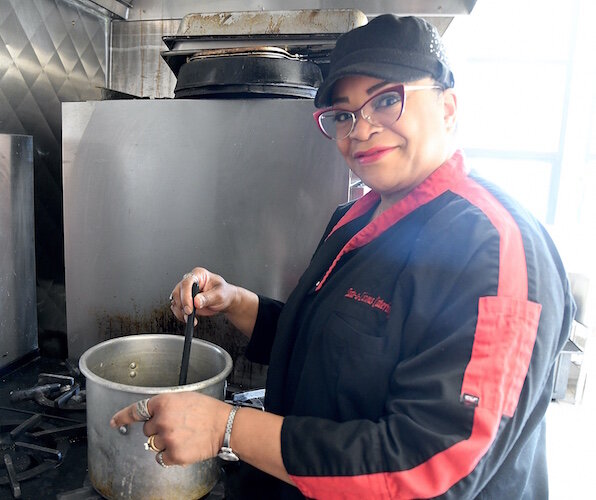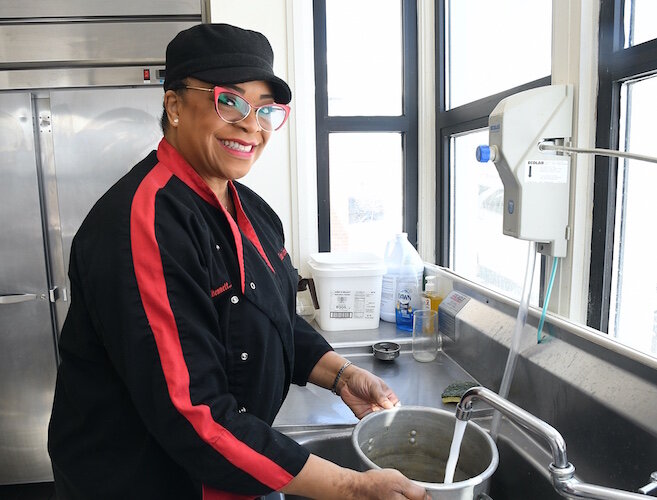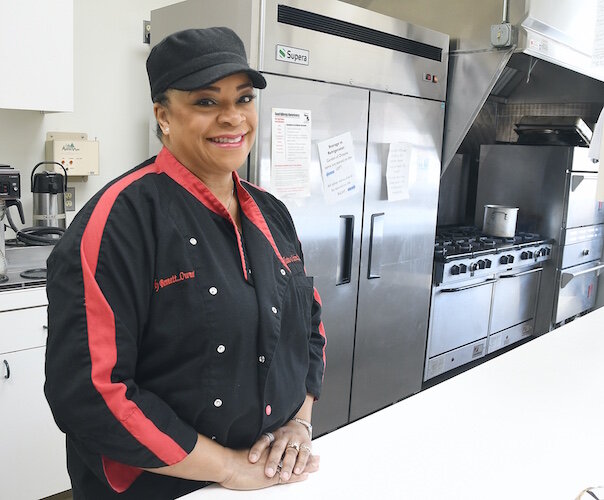Battle Creek caterer sees business coming back but plans to hold on to her side gig for now
The pandemic has hit entrepreneurs across the board, closing some 3.3 million small businesses at least temporarily, and the sidelining of 440,000 African Americans was especially severe. Catering business Taste-A-Licious has come through so far but there is a long way to go.
Editor’s note: This story is part of Southwest Michigan Second Wave’s On the Ground Battle Creek series.
Kimberly Bennett could have become a statistic among the growing number of Black business owners who were forced to put a pause on their livelihoods or close for good because of COVID-19.
She has chosen instead to keep the doors of her Battle Creek-based catering business open and started a new venture in cosmetology in the midst of the pandemic to maintain a revenue stream until in-person gatherings are allowed again.
“I’m not there every day. Just when jobs come up I go in,” she says of the commercial kitchen space inside the First Congregational Church which is home to her Taste-A-Licious catering business.
When the pandemic hit Bennett says her catering work came to a “screeching halt” and the majority of the 40 to 50 jobs she had lined up were either canceled or rescheduled.

Returning those deposits, she says, “has been just really hard for me.” She is doing better than some, however, since her husband has remained employed throughout the ongoing state-mandated business closures, an occurrence she calls a “plus.”
“I have to count my blessings,” Bennett says, among those that her catering company does not serve food on-site. She has continued to prepare meals for groups of 10 or more that are strictly pick-up or delivery.
That she has been able to keep the doors at Taste-A-Licious open, is a positive sign in the midst of alarming national statistics.
A study conducted in early 2020 by the National Bureau of Economic Research found that the COVID-19 economic shutdown hurt African American businesses the most among racial and ethnic groups in the U.S., with a 41% decline of black owners from February to April. The study was the subject of an article that appeared on the Bloomberg News website.
Overall, the number of operating business owners of all groups fell to 11.7 million in April from 15 million two months earlier, a 22% decline that the report’s author, Robert Fairlie of the University of California at Santa Cruz, calls “unprecedented.” Aside from Blacks and immigrants, Hispanic small business owners also fared poorly, with a 32% decline over the period, while Asians and females saw drops of 26% and 25%, respectively.
The number of businesses owned by White men or women fell 17%, the study says.
“While the pandemic has hit entrepreneurs across the board, closing some 3.3 million small businesses at least temporarily, the sidelining of 440,000 African Americans was especially severe. Black owners may have fared worse because fewer of them operated in industries deemed “essential” during the pandemic, among other factors,” according to the NBER paper.
Black-owned businesses are widely varied by industry, according to a study done by Guidant Financial.
“The top industry is business services, with 20 percent of survey respondents owning a business in this industry. The second, third, and fourth most popular industries are all tied at just nine percent each: retail; health, beauty, and fitness services; and food and restaurant. The fifth most popular industry for black business owners is construction and contracting, at eight percent,” the Guidant study says.
“The negative early-stage impacts on minority- and immigrant-owned businesses, if prolonged, may be problematic for broader racial inequality because of the importance of minority businesses for local job creation, economic advancement, and longer-term wealth inequality,” Fairlie says.
Depending on the size of catering jobs, Bennett had pre-COVID, she was employing anywhere between six and 12 individuals on a temporary basis, in addition to her and her assistant. She laments the loss of income for them as much as she does for herself.
A report, “8 Insights on the State of Black Entrepreneurship”, from American Express reports 47% of African-American small business owners run their businesses by themselves, compared to the 33% of average small business owners. And African-American businesses have fewer employees: 38% have 2-5 employees and only 7% have 6-10 employees. This compares with the average small business owner, with 41% employing 2-5 workers and 12% employing six to 10 workers.
Hope vs. reality
With more people being vaccinated and state-mandated orders gradually lifting, calls for Bennett’s culinary talents are steadily increasing as people feel more confident about holding in-person gatherings while continuing to be mindful of the need to maintain health and safety protocols. Despite the six large orders that have come in and her anticipation that more will follow, for now she plans to keep her nail business – Kreative Nail – going so she has a diversified revenue stream.
She sees her nail clients, one at a time in her home. In addition to the title of “chef,” Bennett is also a cosmetologist currently working to get her license renewed after letting it lapse while she was dealing with a cancer diagnosis.
“I’m just starting out so I only have about six clients,” Bennett says. “I did it because I want to give people what they want. A lot of times when people get their nails done, something goes wrong. If you give people what they want and they know you’re working on them specifically versus making them feel like they’re on an assembly line, it makes a lasting impression.”
While the nail business is bringing in money and giving her opportunities to use other talents, she says she’d like to focus on her catering business and have her own stand-alone space with a commercial kitchen. That was always the plan, but securing the necessary financing has been and continues to be a struggle.
“I have gotten no loans for anything,” Bennett says. “You have to jump through so many hoops all the way down to if you’re licensed to do work at an event to wanting to know where you’re catering. There’s just so much red tape. I just feel like as long as you have a solid business plan you should be able to get a loan and make it work.”
Lack of capital and cash flow is the biggest challenge for African-American small business owners, according to Guidant Financial, a company dedicated to supporting small businesses with data trends and insights. While these are challenges faced by small business owners in general, Guidant says fewer African American businesses are approved for financing often at lower amounts of money with higher interest rates.
“That wealth gap also contributes to financing challenges…making it harder to get financing. Without the funds to invest in as many resources as other businesses, such as hiring talent or marketing and advertising, competing for contracts or attracting clients becomes exponentially more difficult,” according to Guidant.
Bennett says she’d like to be able to more effectively market Taste-A-Liscious and establish a solid foothold within the downtown business community, in addition to purchasing vans to transport her food and workers, but this takes funding that she doesn’t have.
“I try to cut costs where I can,” she says, adding that she feels like a minority within a minority as an Afriacn American woman and small business owner.
The Guidant report says, “There are more female African-American small business owners than the general population of business owners. In the American small business universe, 27% of small businesses are women, among African-American owned businesses, 35% are women.”
The more concerning statistic is about earned average revenue, says Rieva Lesonsky, CEO of BrowBiz Media, in an article she wrote for SCORE. African-American businesses owned by women, according to the American Express report she cited, earned an average of $24,000 per firm vs. $142,900 among all women-owned businesses. This gap, says the report, is “the greatest of any minority group.”
Persistence fueled by a passion
Bennett says she knows she’s lost jobs because of the color of her skin and because of her unwillingness to accept less than what her work is worth.
On one occasion, a prospective client who came to Taste-A-Liscious, immediately assumed that her assistant, who is White, was the owner.
“Sometimes I will go to cater an event, or I talk with someone over the phone, and we meet for a consultation, and they ask me if I was the person they talked to over the phone.” When she confirms that it was, “They get quiet because they weren’t expecting me to be Black,” Bennett says.
There have been times when she says the money just wasn’t worth the attitudes or demands she knew she would have to put up with. This included one individual who thought Bennett would be willing to reduce the quoted price because she is Black and needed the business. Stereotyping is something she has been dealing with her whole life.
“I think it’s something within them,” Bennett says of people who treat her as if she is ‘less than.’ “It’s something they haven’t dealt with within themselves. If there was blood on the ground, you wouldn’t know if that blood came from a Black or White person. There are brown eggs and white eggs, but the yolks look the same.”
She says she is grateful to be working out of First Congregational Church, which has a clearly stated mission to “embody God’s love on earth by growing a welcoming, diverse, caring and passionate community that feeds the mind and fuels the spirit.”
The church became her business sanctuary in 2016 when she decided to focus on catering as a business and connected with Jaimie Fales, FCC’s Building Administrator.
“I told (Jaimie) that I needed a licensed kitchen to work out of and she and I sat down and worked it out and I received my keys to the building,” Bennett says.
She was 13-years-old when she started to learn her way around a kitchen and honed her skills under the direction of her grandfather, Jerome Winston. He owned Winston’s All-American BBQ in Lansing and he put her to work doing all of the baking as well as cooking ribs on a grill.
She has gone on to use those skills during catering jobs that have taken place at the W.K. Kellogg Foundation, Post Foods, the Record Box, and Riverside Country Club. Her most-requested dishes are roasted wings, macaroni and cheese, a layered salad, and beef brisket.
“I love to make smoked beef brisket. It’s one of my favorites. It’s so tender and when you taste it, it leaves a good memory,” Bennett says, adding that her breakfast egg bake with pot roast, rosemary potatoes, cheese, and gravy is “just a piece of heaven.”
Her joy comes from watching the reactions on people’s faces when they take a bite of her food. She is holding fast to her father’s prediction that once the pandemic is under control, her business will take off again and she can once again live her mantra — “Cooking with LOVE, baking with my HEART!”
“My passion is cooking food that tastes delicious,” Bennett says. “It’s a beautiful thing when a caterer and a passion come together.”
















